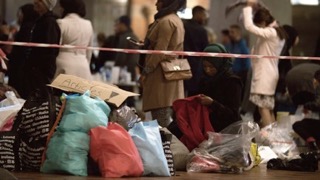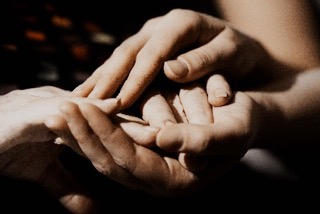Lead Pastor's Blog
Thoughts from our Lead Pastor, Matthew DyerJustice Is Love In Action

As followers of Jesus together, we are called to be a prophetic community. In my last post I shared how important it is for us to be a community of love in the current troubled political climate. Today I’d like to explore what it means for us to be prophetic, and why silence on issues that seem political is not possible for us as a church. If we remain silent, we cease to be the church.
The ancient Hebrew prophets challenged political power (the kings) and religious power (the priests). The true prophets did not take a political side but fearlessly spoke out against injustice and challenged any political leader whose actions and policies (intentional or not) had a detrimental impact on the poor and the oppressed. Jesus came in this same tradition: he did not align with any political “party” (and there were several that courted his attention), but time and time again he spoke clearly and courageously on behalf of the poor and vulnerable.
Jesus calls us to do the same, no matter what our political allegiances or persuasion. In Matthew 25: 31-46 he defines caring for the poor and the afflicted and welcoming the outsider as what distinguishes us as his followers. That means we can’t hide from politics. Whenever political decisions get made or political actions are taken that are detrimental to the poor and oppressed, we cannot be silent as followers of Jesus. This is not the church crossing a line into the political arena; it’s political power crossing the line into the church arena. If we are to authentically be the church, we will inevitably be called to challenge political leaders, decisions and outcomes in a non-partisan way. We are not on the side of any political party; we are on the side of the poor, the stranger, the voiceless and the oppressed.
I’d like to offer several ways we can all speak and act for justice in the current turmoil no matter what our political persuasion:
- We can all stand up and speak out for the vulnerable, the poor and the marginalized whenever we hear hateful speech or see hateful actions. Let’s do this lovingly whether it’s in public, in private conversations, with family or at work.
- Protest, advocacy and resistance are all ways we can affect the political process, and this will look different for each one of us. This requires great sacrifice and energy but the Civil Rights Movement has shown us just how effective this can be. Three of the many qualities Dr. Martin Luther King embodied stand out to me as beacons to guide our path at the moment: a commitment to non-violence, unswerving determination to walk the path no matter how long and hard, and a vision of love that transcends hate.
- All of us can reach out across social, racial, cultural, religious and political barriers to embrace the other. We have opportunities at work, school, in our neighborhoods and in our church to break down walls, listen and understand. In the current climate of division and polarization the world is crying out for courageous women, men and children to venture across the divide. Let’s be bearers of healing.
- As followers of Jesus we are all called to love, support and take care of refugees. The Hebrew Scriptures are full of admonitions to the people of Israel to care for the foreigner and the stranger, remembering that they too were once refugees in Egypt, where they felt the prejudice of being rejected as outsiders. Jesus himself was a refugee, ironically having to flee to Egypt with his family to escape political persecution in Israel (Matthew 2:13-18). So we should stand with refugees: those already in our country and the millions around the world fleeing unimaginable violence and oppression. I have been meeting with many leaders from various faith traditions in our local community to see how we can work together on this issue.
- Many Muslims are also feeling vulnerable and afraid. They are our sisters and brothers, and we have longstanding friendships with two nearby mosques (Idare-e-Jaferia and Baitur Rahman). Many of us have attended interfaith events and meals at these mosques and both mosques participated in our own interfaith event on Martin Luther King Jr. Day. We have specifically extended love, friendship and offers of support to these communities and we will host another meal together in the spring as part of our growing friendship.
Such action takes great effort and a willingness to risk being misunderstood, rejected and disappointed. That is the challenge of being a prophetic community. Jesus was under no illusions about the price prophets have to pay (Matthew 5:11-12) and as one in the prophetic tradition he paid a heavy price himself. While we are unlikely to have to die for the cause of justice, each sacrifice we make, each time we put the interest of others before our own, every time we stand with the vulnerable and oppressed, we die a little. In that death there is love (John 15:13) and in that love there is life. We’ll explore more about what this means and looks like in the next post.
Love Is Greater Than Politics

The current political climate has led to fear, vitriol and contention. For some it feels like the world has been turned upside down with conflict and opposing viewpoints, while for others it feels like the world has always been this way and we are all just waking up to it. Still others wonder what all the fuss is about. I want to address through a series of three posts over the coming weeks how we might respond to the current situation as a community.
Some would say churches (and pastors especially!) should not venture into political discussions – it’s just too divisive. While I agree we should be very careful in how we go about it, silence on these issues is not possible for us as a church. If we remain silent, we cease to be the church. As followers of Jesus together, we are called to be a prophetic community. The call to be prophetic means we speak out and act for justice. It’s a defining, distinguishing characteristic of what it means to the church and I will share more about that in the next post.
We are not just prophetic; we are a community. Jesus called us to love one another and defines this love as another distinguishing feature of the church (John 13:35). If we stop loving one another, we stop being the church.
I have had many conversations with people at Cedar Ridge recently who are weighed down under a burden of anxiety, fear, confusion and distress about things political leaders have said and done that could have serious detrimental impact on the poor and vulnerable. As a community we need to care for one another and support one another lovingly. We must be a safe community where it’s possible to be our true selves, share our deepest angst, and voice our greatest concerns. We need to listen to each other, bear one another’s burdens, and weep with those who weep (Romans 12:15).
I have also had conversations with some who do not feel safe at Cedar Ridge because they have a different political opinion to the majority. They are afraid of being judged for how they voted or for taking a different stance on certain issues. We have to be a safe community for everyone. As followers of Jesus, we just don’t have other options when it comes to loving and not judging (Matthew 5:43-45; Matthew 7:1-5). This does not mean we can’t disagree, or challenge, or speak out. But it does mean we have to do so with a radical commitment to love one another.
To love like this, to be the church, we have to engage with one another. Silence is not an option; hoping all this will blow over and go away is not an option. For those who are struggling let’s share our burdens and support one another. If we are not struggling, let’s look out for and listen to those who are. Let’s seek to understand, support, and encourage. For those who are afraid of being a political minority here, let’s not withdraw. Let’s be courageous and share how our commitment to Jesus has informed the way we think about politics, how we vote, and how we put the interests of others before our own. Whatever our opinions, let’s be willing to lovingly challenge and be challenged, and let’s be open to changing our minds.
I’d like to offer three things we can all do to add more “good” to the discourse going on in society and in our church currently:
- Pray: We are called to pray for our political leaders whether we agree with them or not. Let’s pray that our political leaders would “act justly, love mercy and walk humbly” (Micah 6:8). Let’s pray for all those who are vulnerable and feel afraid. Let’s pray for peace and reconciliation in our country and the world. And let’s open our hearts to be transformed by God and be the Good News in the world.
- Look after one another: Let’s engage with one another in our groups and friendship circles, and let’s be open to “the other.” As the community of Christ, we owe this to one another. Let’s share our stories and be willing to believe the best and trust one another.
- Look after ourselves: We are all being challenged and pushed out of our comfort zones so let’s pay attention to our own inward state. Let’s feel the reality of anger without letting it turn to hate. Let’s lay down fear and embrace love. Let’s find peace within, so we can be bearers of peace and love in the world.
Above all else let’s not give up, or lose hope. We are following One who is Hope itself. Jesus believed another way and another world is possible. Even when they put him to death, this hope was resurrected. Nothing can stop the love of God, because love never fails.

Matthew Dyer, Lead Pastor
Interested in listening to messages?
You can hear messages from Matthew and our other speakers right on our website.
